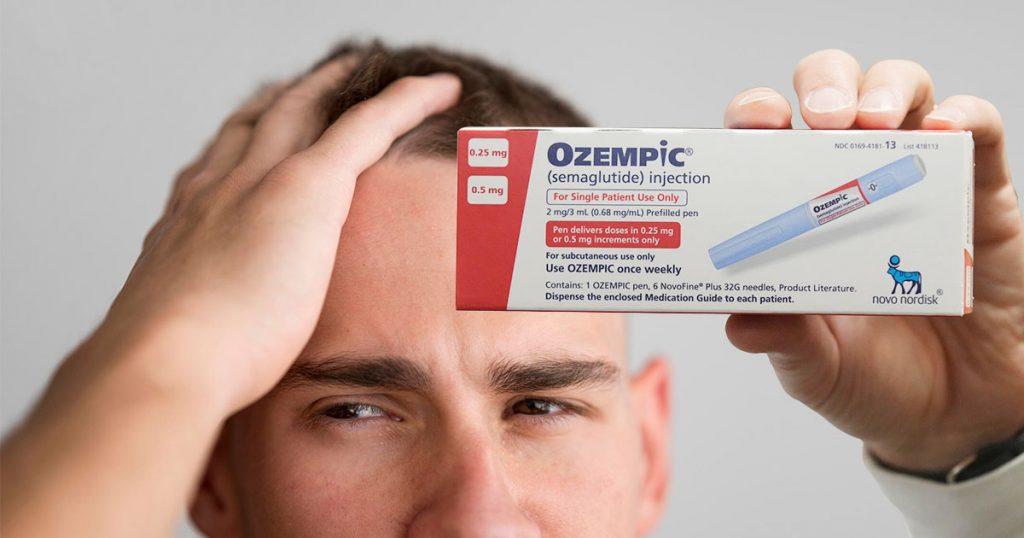Ozempic is a drug that is mostly used to treat type 2 diabetes. While Ozempic is usually safe, some users have noticed hair loss as a side effect. It’s important to understand if there’s a link between Ozempic and hair loss. Does Ozempic cause hair loss? What can you do if it happens, and will your hair return to normal once you stop taking it?
What is Ozempic?
Ozempic is a drug for people with type 2 diabetes. It is a GLP-1 receptor agonist, which is a type of medicine. These medicines work like the hormone glucagon-like peptide-1 (GLP-1), which controls blood sugar levels.
When you take Ozempic, it activates the GLP-1 receptors in your body. This leads to a few things that help manage diabetes:
- More Insulin: Ozempic helps your body make and release more insulin from the pancreas. Insulin reduces blood sugar by allowing cells to absorb glucose from the bloodstream.
- Less Glucagon: Insulin decreases blood sugar levels by enabling cells to absorb glucose through the bloodstream.
- Slower Stomach: It slows down how quickly your stomach empties, which stops blood sugar levels from spiking after meals.
- Feeling Full: Some people may feel less hungry and fuller after taking Ozempic, which can help them lose weight.
In simple terms, Ozempic helps control blood sugar in people with type 2 diabetes by boosting insulin, cutting down on glucagon, slowing stomach emptying, and making you feel fuller.
What are the side effects of taking Ozempic?
Ozempic, like many medications, might have negative effects. Some common side effects of Ozempic may include:
- Nausea: Got a bad stomach feeling
- Diarrhea: Having loose or watery stools
- Vomiting: Throwing up
- Constipation: Having trouble passing stools
- Stomach pain: Feeling pain or discomfort in your stomach
- Decreased appetite: Not feeling as hungry as usual
- Fatigue: Feeling tired or weak
- Headache: Pain or discomfort in your head
- Dizziness: Feeling lightheaded or unsteady
- Injection site reactions: Pain, redness, or burning where the shot was given
Ozempic can sometimes have more dangerous side effects, like pancreatitis (inflammation of the pancreas), kidney problems, or allergic reactions. Contact your doctor immediately if you have any odd or dangerous adverse effects while taking Ozempic. They’ll be able to advise you on the best strategy to deal with your negative effects.
Can Ozempic cause hair loss?
Hair loss isn’t usually listed as a side effect of Ozempic, but some people may notice their hair fall out while taking this medication for type 2 diabetes. The underlying condition Ozempic is treating might instead be to blame for the hair loss. Type 2 diabetes can increase the risk of developing alopecia, a condition that causes hair to fall out, thinning, and loss.
People with type 2 diabetes are more likely to have alopecia areata, a type of alopecia that is linked to autoimmune illnesses. In alopecia areata, the body mistakenly attacks hair follicles, leading to damage, shrinkage, and a halt in new hair growth. Even though Ozempic helps manage type 2 diabetes by boosting insulin production, the disease itself can still contribute to issues like hair loss.
How to Stop Hair Loss from Ozempic
Talking to your doctor if you are losing your hair while taking Ozempic is important. They can help you determine why you’re losing your hair and suggest the best treatment methods. Sometimes, your healthcare provider may suggest stopping Ozempic or switching to a different medication if they believe it contributes to your hair loss.
In addition to consulting with your healthcare provider, there are several steps you can take to help stop hair loss:
- Nutrition: To keep your hair healthy, get enough nutrients like iron, zinc, biotin, and other vitamins and minerals.
- Gentle Hair Care: If you want to keep your hair healthy, avoid strong chemicals and treatments.
- Scalp Care: Keep your scalp clean and healthy to promote hair growth.
- Stress Management: Stress can worsen hair loss, so lowering stress levels might help.
- Avoid Tight Hairstyles: Tight hairstyles can damage your hair and make you lose hair.
Will my hair grow back after stopping Ozempic?
If you stop taking Ozempic and your hair loss is due to the medication, there is a possibility that your hair may grow back. However, hair growth is different for everyone, and it could take a while for your hair to get back to how it was before. Patience and caring for your hair and scalp while waiting for regrowth are essential.
Understanding the Connection of Ozempic and Hair Loss
While hair loss is not a prevalent adverse effect of Ozempic, it is possible for certain people. If you are concerned about hair loss while taking Ozempic, consult your doctor. They can help you establish the reason for your hair loss and recommend the best treatment alternatives. Remember to care for your hair and scalp to promote healthy hair growth.
